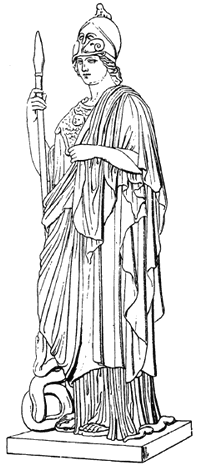
Pallas Athena, beautiful owl-eyed goddess of the city, wisdom and the arts.
Daughter of Zeus, and only by him, the Goddess Athena was not generated by any woman. She leaped from the head of Zeus, already adult, dressed in her armor. But the mother is not completely missing from the miraculous birth of Pallas Athena. According to Hesiod's account of the weddings of Zeus, the King of the Gods chose Metis as his first wife. She was of all beings "the most knowing" (as the word metis is interpreted), or "of many counsels" as translated in the sense of the Homeric epithet polymetis.
As she was about to give birth to the Goddess Athena, Zeus deceived his pregnant wife with cunning words and assimilated her into his own body. Mother Earth and Father Sky had advised him to do this so as to prevent any of his descendants from robbing him of his kingly rank. For it was destined that the most brilliant children were to be born to the Goddess Metis: first, the daughter Athena, and later a son, the future King of Gods and men.
In the most ancient account, the Iliad, Athena is the Goddess of ferocious and implacable fight, but, wherever she can be found, she only is a warrior to defend the State and the native land against the enemies coming from outside.
She is, above all, the Goddess of the City, the protectress of civilized life, of artesian activities, and of agriculture. She also invented the horse-bit, which, for the first time, tamed horses, allowing men to use them.
She is the favorite daughter of Zeus; and that's why he let her use his insignia: the terrible
shield, the aegis and his devastating weapon, the ray.Athena often helped heroes, like Jason and Perseus. She wore an aegis, a goatskin shield which had a fringe of snakes. When Perseus killed the gorgon Medusa, whose face turned men to stone, he gave the gorgon head to Athena, and the goddess placed it on her aegis.
When Hercules went mad and killed his children, Athena stopped the disaster from getting worse. Just as the insane hero turned to kill Amphitryon, Athena threw a stone at Hercules, knocking him unconscious, so his mortal father was spared. Athena also helped Hercules at many points during his Labors. She provided him with the krotala he used to scare the Stymphalian Birds, and she carried the apples back to the garden of the Hesperides.
Her greatest invention of all was the art of weaving. Throughout antiquity she was renowned as possessing the highest skills in this field, and it was she who wove and embroidered the superb garments worn by the gods and heroes. Her first pupil at the loom was Pandora, who passed on the knowledge to the other women. This attribute of Athena's was the source of the myth of Arachne , another skillful weaver who dared to compare herself to the goddess and challenge her to a competition. The goddess turned Arachne into a spider (still known by that name in Greek today) and condemned her to spin in perpetuity but to have all her works destroyed by man.
The peaceful side of Athena's character was symbolized by the olive, the tree which she gave to the Athenians and taught them how to cultivate. According to the myth, it came about that there was a contest between Athena and Poseidon over which of them should be the patron of the city of Athens. The other gods advised Athena and Poseidon to offer the city one gift each, and the winner of the contest would be he or she whose gift was the better. Both ascended to the Acropolis, and Poseidon struck the ground with his trident: a spring of salt water immediately welled up. Athena stamped her foot, and an olive, the first in the world, sprouted on the spot. In the end, the city was awarded to Athena, and took its name from her. The divine olive tree continued to adorn the sacred rock, and when the Persians burned the Acropolis in 480 BC it immediately put out fresh leaves. In commemoration of this, an olive tree has been planted on the Acropolis and can be seen today on the west side of the Erechtheum.
The most used expression to describe her is "the bright eyed." She is the first of the three virgin Goddesses, also known as Maiden, Parthenos, and from this name was taken the name to the most important Temple dedicated to her, the Parthenon.
In poetry she is the incarnation of Wisdom, Reason and Purity.
The owl, was consecrated to her at birth and is symbolic of her wisdom.



